Independence day
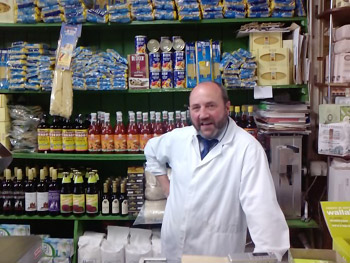
A dwindling number of Irish retailers continue to revel in their independence. GILLIAN HAMILL learns more about the trials and tribulations involved in going solo
14 July 2010
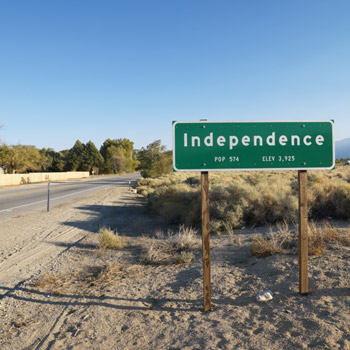 Considering the continuous recruitment drive embarked upon by Ireland’s various symbol groups – particularly within the last decade – it takes a certain amount of dogged determination to remain an independent retailer. The administrative burden which comes with being excluded from central billing, requires a stern constitution for hard work which ultimately not all FMCG players are able, or willing, to stomach.
Considering the continuous recruitment drive embarked upon by Ireland’s various symbol groups – particularly within the last decade – it takes a certain amount of dogged determination to remain an independent retailer. The administrative burden which comes with being excluded from central billing, requires a stern constitution for hard work which ultimately not all FMCG players are able, or willing, to stomach.
Especially in the current economic climate, when even smaller convenience stores are placing an increasing focus on providing value, promotions, and an ever-wider range of own brand goods – are independent retailers concerned they’re unable to match the retailing ‘big guns’ – and their much-flanked arsenal of buying power? This seems an increasingly prescient concern, considering that according to RGDATA director general Tara Buckley one in four retail jobs have been lost over the last 12 months. With this in mind, ShelfLife decided to talk to four different types of independent retailers within the FMCG sector in order to learn more about the unique challenges and advantages involved in going it alone.
THE COUNTRY GROCER
Cosgrove’s, Market Street, Sligo
Retailer: Michael Cosgrove
“Which soya beans are the best for providing protein?” and “Just a little bit of tumeric for a recipe – yes, the man is cooking!” Not the usual requests one might expect to hear from a burly middle-aged man. Such is the patter of chat at Cosgrove’s Country Grocer in Sligo however, and it could be argued that what the dictaphone captured in the moments between ShelfLife’s official interview might well capture more of the true essence of the store.
Yet behind this easyflowing banter – where a point is made of knowing each customer by their first name – retailer Michael Cosgrove says an incredible amount of work goes into keeping the store up and running. “Yes, there is demand. But it’s hard work, as you can see yourself, incredibly hard. It never stops actually; we’re here from 9.30am to 8 o’clock every night except Sundays.”
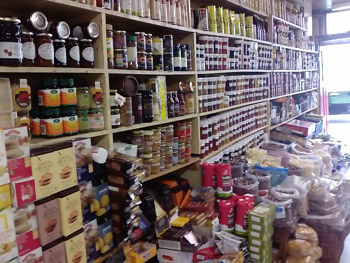 However, the task is made easier by having one main supplier such as Independent Irish Wholefoods, based in Co Cork. “When you have a great supplier like Independent Irish Wholefoods, they’ll give you a weekly delivery, actually twice weekly delivery, so if you want something you’ll always get it,” says Cosgrove. “You’re never waiting for stuff. If we ring on a Monday, we’ll have the order on a Wednesday which is great. Sometimes we’re tempted to go with the English guys but there’s no point.”
However, the task is made easier by having one main supplier such as Independent Irish Wholefoods, based in Co Cork. “When you have a great supplier like Independent Irish Wholefoods, they’ll give you a weekly delivery, actually twice weekly delivery, so if you want something you’ll always get it,” says Cosgrove. “You’re never waiting for stuff. If we ring on a Monday, we’ll have the order on a Wednesday which is great. Sometimes we’re tempted to go with the English guys but there’s no point.”
Reliability is his most important consideration. “You might get something 10% cheaper,” he notes, “but sure what’s the point when you’re waiting two weeks for it? That’s no good.”
The third generation grocer whose family first opened Cosgrove’s back in 1898, also has several smaller suppliers; yet over the years has noticed a marked drop-off in the number of reps on the road. “We’d have had 20 or 30 of them at one stage, right up to the late 70s, and early 80s, but they’re all gone now.”
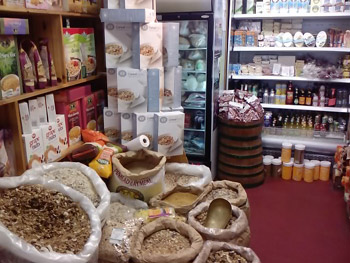 But although less reps are calling round, Cosgrove is still making a concerted effort to ensure he moves with the times and delivers exactly what his modern day customers want. Speaking about one of his latest lines, he says, “I saw it in a woman’s magazine and that’s how you learn about things. It might sound a bit weird but women’s magazines are incredible for keeping you up to date with what’s happening.”
But although less reps are calling round, Cosgrove is still making a concerted effort to ensure he moves with the times and delivers exactly what his modern day customers want. Speaking about one of his latest lines, he says, “I saw it in a woman’s magazine and that’s how you learn about things. It might sound a bit weird but women’s magazines are incredible for keeping you up to date with what’s happening.”
The likes of such varied sources are vital for Cosgrove, as he reveals he simply “doesn’t get the time” to visit retail tradeshows. But he adds: “Companies will come round with new products or send you their brochures and we work off that so we know what sells and what doesn’t sell, and we’re always trying something new.”
And while it’s often important for symbol group retailers to maintain a standard specification, many of Cosgrove’s fixtures and fittings actually date all the way back to 1898, and the retailer has no further plans to expand the store. “I don’t want to change the character of the shop in any form because it’s basically unchanged. The shelving is still the original shelving.”
Unfortunately however, Cosgrove knows independent stores such as his own are becoming increasingly unique. “They’re dying out and it’s sad to see. [Independents] are lovely in any town, but they’re very hard to find now. That generation that worked them, there’s nobody coming behind them to continue them. Definitely not; the work is too hard.”
He adds that with independent stores, “you’ve more choice, more flexibility. I often think with these groups, there’s no variety – whether it’s from Malin Head to Ballihadreen – it’s the same things you’re going to see, in the same places, in the same shop, and that to me is no choice. It’s a standard format – I know it works but it’s boring.”
One point that does cause him some chagrin as an independent retailer however is that “the amount of bureaucracy you have to put up with now is just incredible, it’s insane. I won’t bore you but the latest one is they’re bringing me to court for selling porridge,” he laughs somewhat ruefully – explaining that the Department of Agriculture has ruled he shouldn’t be allowed to sell open bags of organic porridge in the store – a tradition kept over many decades. But then another customer walks in, and he’s back to engaging in another tradition he’s specialised in for decades – “the true craft and art of being a shop-keeper” – according to the latest edition of The Bridgestone Guide.
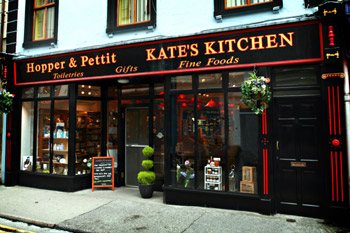 THE DELICATESSEN
THE DELICATESSEN
Kate’s Kitchen, Castle Street, Sligo
Retailers: Kate, Beth and Jane O’Hara
“We love the fact that the produce of local bakers and butchers and growers is welcomed to Kate’s, from Bluebell organic quiches to Woodville eggs, from the McHugh sisters’ cupcakes to Sarah Murphy’s tea bracks. All this lovely doorstep stuff is then haloed by classics like Ortiz tuna or san marzano tomatoes or Filligan’s preserves or Murphy’s ice cream, and it makes for the most irresistible experience.”
That’s the verdict of the Bridgestone Guide on Kate’s Kitchen in the centre of Sligo, and retailer Kate O’Hara (29), who currently runs the store alongside her younger sisters Beth and Jane, tells ShelfLife that maintaining such an appetising range of varied produce can prove a time-consuming task.
“I would say we have over 100 suppliers. We would have big suppliers that we would deal with on a weekly basis, and then we have a lot of local suppliers and the more local we can get, the better. Artisan produce and homemade is fantastic; people love it and it goes down a treat.”
She adds that “not as many” reps as you might presume would visit the store however. “A lot of the bigger companies would employ reps but I suppose smaller companies just don’t have that extra revenue to spend.
“A lot of suppliers actually use agents as well, which is great, because you might have one person calling in and they could be representing five or six different companies in their products and that’s great because it showcases everything that they have. You can then order the goods through that rep so it certainly makes it a lot easier as well.” On the other hand she notes: “But then you’re dealing with a middle man. You’ve got extra costs to factor in so it drives the price up.”
And despite the occasional appearance of a time-saving agent, O’Hara says she has to dedicate a large chunk of her week to keeping abreast of new products. “I think you do have to dedicate a lot of time in the week to ordering and also researching new products,” she says. “I actually find not all new suppliers are that quick in coming into shops, and trying to sell on their produce. For some reason, you have to go out that little bit further and try and find [the goods] or else you only hear of them through any PR that they get nationally.” In fact O’Hara believes there’s further room in Ireland for more trade publications.
“Obviously we do buy trade magazines as well, though there aren’t enough Irish trade magazines related to the industry, so we get a lot of them over from the UK. However there is a challenge if you’re trying to bring your product over from the UK if you’re dealing with huge distribution costs.” O’Hara is also keen to buy Irish to “support the national and local economy.”
In researching customer trends and new products, she says that as well as tradeshows, “locally you’ll find you’ll get a lot of information from farmer’s markets, and newspapers as well; you’ll just pick up clippings of new things that people are doing.”
One factor which O’Hara believes she does miss out on is the buying power which comes with belonging to a group. “In saying that, suppliers do try and help you out by all means and every so often they will give you complimentary items be it chocolates or chutneys or whatever to do an in-store promotion.”
Matching supermarkets’ prices can prove a hard task nevertheless. “When you look at supermarkets, you might see you have the same item on the shelf, which we try not to do but you’ll always end up having one or two things in common. However they could be selling that item at a price that you couldn’t even buy it in at.”
Pricing frustrations aside, O’Hara says she doesn’t miss the support group retailing affords. “I like the fact that we have the control over what produce we take in and how we do things,” she says. “It’s great not having to run something by a million managers before we make a decision. There’s really the three of us and we either nod our head in agreement or shake it in reply. So I prefer the way we have it, although it always is nice in tough times if you did have the support of bigger management.”
Having previously worked in the hospitality and marketing sectors, O’Hara says she had no previous business experience in the food industry before acquiring the 28 year old store two and a half years ago, but has certainly learnt a lot in that intervening period on-the-job.
The biggest change Kate and her sisters made upon acquiring the store from previous owners Kate and Frank was to add a breakfast bar and seating area in the corner in order to “tap into the lunch market in a bigger way.” The trio then started making their own homemade lunches, such as soups, sandwiches and wraps which has received a very positive reception from their new lunchtime clientele. That change made, O’Hara simply plans to consolidate the reputation of the store built up over the last three decades, and reckons: “You learn something new everyday anyway, please God when we’re 20 or 30 years here, we’ll still learn something new.”
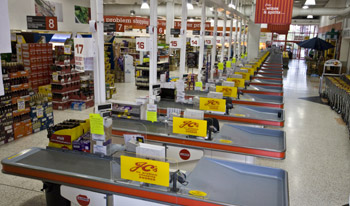 THE SUPERMARKET
THE SUPERMARKET
JC Savages, Swords, Co Dublin
Retailers: Michael, Robert and Niall Savage
A stand-up comedy gig in Dublin’s International bar was where I first heard of JC Savages – one of the last independent supermarkets operating in the Republic – some time ago. It wouldn’t be the norm for a supermarket flyer to form the basis of a comedian’s routine, but then again, perhaps it’s not so surprising considering the humour retailer JC Savage injected into his store on a daily basis. Upon buying job lots from wine warehouses, his wine sale ads would urge “Don’t tell your friends in Dublin 4…these are only for the people of North Dublin!”
Such ads were just one flavour of the retailer’s sense of fun which led Superquinn founder Fergal Quinn to comment: “What impressed me was the magic he put into the shopping experience.” And Quinn had an opportunity to see at first hand how JC ran his business when the supermarket took part in Quinn’s RTÉ television series Retail Therapy earlier this year. Sadly, JC died in April just before the Retail Therapy programme was broadcast, the victim of a virus caught abroad several years previously. A key part of the programme however also focused on the greater responsibilities given to three of the retailer’s nine children – Michael, Robert and Niall – who are now directors of the supermarket alongside their mother Geraldine.
During the show, Quinn attempted to get to grips with de-cluttering the value-packed store which JC declared followed “the old Denis Guiney approach: pile ‘em high and sell ‘em cheap.” His three sons also flourished in their newly assigned roles; with Michael put in charge of people and customer service, Robert in control of the fresh food category, and Niall assigned the task of creating more space in the jam-packed stock room.
 Having impressed customers when the store officially re-launched in October; the trio are now upholding their father’s belief in the importance of operating independently. JC was known for sourcing goods directly from wholesalers all over Britain, mainland Europe and the US. He would also buy goods that were short-dated (although not fresh foods) and needed to be sold within a few weeks, and could always be trusted to get the stock shifted. Now, Michael Savage says: “The reasoning behind staying independent is that the biggest thing we have is flexibility. If a supplier has a deal, we can buy it straight away and we can have it on the shop floor in a day or less. We can get deals other people can’t get because we’re not locked up in red tape.”
Having impressed customers when the store officially re-launched in October; the trio are now upholding their father’s belief in the importance of operating independently. JC was known for sourcing goods directly from wholesalers all over Britain, mainland Europe and the US. He would also buy goods that were short-dated (although not fresh foods) and needed to be sold within a few weeks, and could always be trusted to get the stock shifted. Now, Michael Savage says: “The reasoning behind staying independent is that the biggest thing we have is flexibility. If a supplier has a deal, we can buy it straight away and we can have it on the shop floor in a day or less. We can get deals other people can’t get because we’re not locked up in red tape.”
Naturally, with 30,000 different product lines in a supermarket with a sales area of some 26,000 sq ft, JC Savages has hundreds of suppliers which represents a huge task in terms of administration. Nevertheless, Michael explains that each charge hand has responsibility for buying for their particular department, and this also allows staff to enjoy more varied roles.
The bargain people don’t expect will always form a key part of the supermarket’s magic – as happy customers perusing the store’s ‘Wall of value’ will testify – but nevertheless the three directors have been trying to take Quinn’s advice onboard.
“It is hard to change” concedes Michael. “Striking the perfect balance [between maintaining bargains and floorspace] isn’t that easy but we’re working on that. We want to keep the same spirit my dad created and keep on giving customers what they’ve come to love and expect.” Customers such as the elderly lady and her two sons who visit the store from Inchicore because they “love the uniqueness,” that is.
JC famously said he was “a good shopkeeper but probably a very bad businessman.” However he demonstrated his ability to be a shrewd operator when some 12 years ago, he rebuilt and expanded his small shopping centre on the Rathbeale Road, and personally negotiated with Dunnes Stores to take the front unit, but only to sell textiles – an arrangement which has worked well for both parties. Happily for the store’s many regular customers, his sons now look set to continue in the same tradition.
THE NEWSAGENT
News Centre, Donaghmede Shopping Centre, Co Dublin
Retailer: Joe Sweeney
New NFRN Ireland vice president Joe Sweeney says of himself: “I’m effectively a retailer all my life.” He subsequently has ample experience of both working in a group and independently, and has found the latter is where he excels. Originally hailing from a rural part of Co Mayo, Sweeney left school in 1972 and embarked on a career in retail by joining the now defunct H Williams group in Dublin, before leaving in 1979 and buying his first store in Crumlin with his wife Margaret. Later, when H Williams folded in 1987, Sweeney bought its busy Terenure store in partnership with Musgrave’s SuperValu brand.
As time progressed however, Sweeney realised that for him, a newsagents was the preferable option over a grocery store. “I stopped because I just felt the grocery business was getting so hard,” he says. “The opening hours were expanding, and you were being hammered with new EU laws, labour regulations etc.” He also discovered group trading brought both “advantages and disadvantages.”
“There were certain advantages, in that you were part of a brand with a reputable image, national advertising and so on.” But while promises of “big buying power” enticed retailers into group trading, he adds that, “what you discovered was that in the long run, they were buying well alright, but they were buying for the wholesaler rather than deals being passed on to the retailers. I still hear this from some friends today who are group traders.
 “One of the best examples is confectionery,” he continues. “Under the group scheme, you were not allowed to deal directly with confectionery companies… and as retailers we were grossing about 15% on confectionery. But there’s anything in and around a gross margin of 30% on confectionery…and the retailer was getting none of it.” However Sweeney says that now he deals directly with suppliers he can gain the extra margin instead of the wholesaler, and by “shopping around,” claims he can buy goods in at a cheaper price.
“One of the best examples is confectionery,” he continues. “Under the group scheme, you were not allowed to deal directly with confectionery companies… and as retailers we were grossing about 15% on confectionery. But there’s anything in and around a gross margin of 30% on confectionery…and the retailer was getting none of it.” However Sweeney says that now he deals directly with suppliers he can gain the extra margin instead of the wholesaler, and by “shopping around,” claims he can buy goods in at a cheaper price.
What’s more, he’s found that as the credit crunch tightens, suppliers are increasingly anxious to do business with smaller independents. “I’ve found that very much now in the last 12 to 18 months,” he notes. “Some of them have said it to me themselves; they admit it. They’re delighted now to come and do business with independents and small traders because they are just desperate for business… and they are prepared to do deals. And when they come to me they better be doing deals,” he adds with a grin.
 Although it’s hard work, Sweeney says, “personally speaking I get a great deal of enjoyment from it and a good thrill out of doing my own buying. We get good value and we pass it on to the customer and then the customer perceives me as a professional retailer and sees me as working for them as well.”
Although it’s hard work, Sweeney says, “personally speaking I get a great deal of enjoyment from it and a good thrill out of doing my own buying. We get good value and we pass it on to the customer and then the customer perceives me as a professional retailer and sees me as working for them as well.”
He also finds being located in a shopping centre – where the onus falls on larger retailers to generate footfall – a less stressful proposition. “When I was in Terenure, on the high street there, we would have been the main trader and the onus was on us to pull in the trade. It was costly because even though you could avail of national advertising, you still had to do local advertising yourself. I spent about £2,000 a month on local advertising, whereas I haven’t had to spend a penny here on that.”
The experienced retailer adds that he and Margaret ,who plays a crucial role in selecting and training staff, and two of their sons who also work in the store are “extremely happy” in Donaghmede. Much of that contentment, he attributes to the warmth of the local people.
Sweeney does concedes however that group trading can work well for some, particularly those retailers with ‘a group within a group’ of maybe four or five stores. “Some of them are very good at it and they have their own management structure and their own area manager. They’re given lots of help to set up and they’re very good people and good traders.”
But the real downside he says is that in a group, “reps wouldn’t come near you; it means nothing to them.” Conversely, he says of his store – which generates an overall margin of “well over 20%” despite selling many services such as €1.50 tolls which provide a margin of just 1% – “Everybody is interested in my shop because it’s the best newsagent in Dublin.” In fact, publishers have even been known to call in to see just how he does it.



 Print
Print







Fans 0
Followers